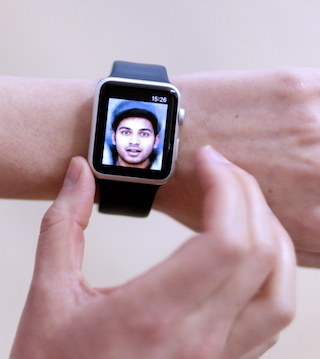 Apple Watches may soon help patients with major depressive disorder (MDD) record their symptoms easily and accurately. Recent results from a Cognition Kit study presented at the CNS Summit Meeting in Boca Raton, Florida, suggest that brief cognitive and mood tests administered through the devices obtained results similar to those collected through standard testing and patient assessments.
Apple Watches may soon help patients with major depressive disorder (MDD) record their symptoms easily and accurately. Recent results from a Cognition Kit study presented at the CNS Summit Meeting in Boca Raton, Florida, suggest that brief cognitive and mood tests administered through the devices obtained results similar to those collected through standard testing and patient assessments.
“Patients with MDD frequently experience cognitive problems such as inattention and memory complaints,” the researchers wrote. “These are often under-recognized and may affect patients’ ability to accurately self-report symptoms. High frequency, near-patient testing may aid communication between patients and clinicians by overcoming challenges such as recall bias.”
In the single-arm study, which was funded by Takeda Pharmaceuticals, researchers enrolled 30 adults aged 19 to 63 years with mild to moderate single or recurrent Major Depressive Episodes and prescribed antidepressant monotherapy. On average, these participants had been taking their antidepressant therapy for nearly 10 months, and 80 percent reported switching from a previous medication.
Participants received Apple Watches with the Cognition Kit application, and over the course of six weeks completed daily cognitive tests and up to thrice-daily mood tests through the device. Researchers compared the results of these app-driven tests against measurements obtained using Cambridge Cognition’s CANTAB cognition test, and from patient-reported measurements of symptom severity, social function, and perceived cognitive difficulties at four points during the study. In addition, the researchers also conducted interviews at the beginning and end of the study period to assess participant’s motivations and potential barriers to adherence.
The researchers reported high levels of compliance with the daily tests, with overall compliance rates of 94.6 percent and 96 percent for the mood and cognitive assessments, respectively. Through qualitative interviews, participants reported varying levels of ease fitting the daily tests into their daily routines due to their mood’s impact on compliance motivation, although some participants said that the daily tests served as a challenge, contributing to their sense of achievement. Others directly cited the app and device as contributors to their engagement, with many suggesting that the Apple Watch itself served as a source of motivation.
As for the test results themselves, the researchers found moderate to high levels of correlation between the daily mood test results and patient-reported outcomes. Cognition tests also significantly correlated with CANTAB working memory and attention tests, altogether leading the researchers to conclude that the digital tests could serve as a novel patient-centric approach to frequently measuring mood and cognition.
“By combining wearable technology with world leading neuroscience, we’ve created an app that collects real time passive and active high-frequency mental health data,” Cognition Kit Chief Scientific Officer Dr. Jenny Barnett said in a statement when announcing the trial earlier this year. “Being able to access data regularly from daily life can help clinical decision making. Healthcare professionals can obtain patient data and increase patient engagement in their treatment.”
This was Cognition Kit’s first contracted study since it was created last year as a joint venture between Cambridge Cognition and Ctrl Group. Takeda, on the other hand, has been getting more involved with digital health. Along with announcing a challenge at 2016’s Health 2.0 conference asking digital heath companies to design innovations for people living with MDD, the pharmaceutical company also announced another collaborative study exploring the effectiveness of mobile apps designed to improve engagement between MDD patients and their providers last month.




















